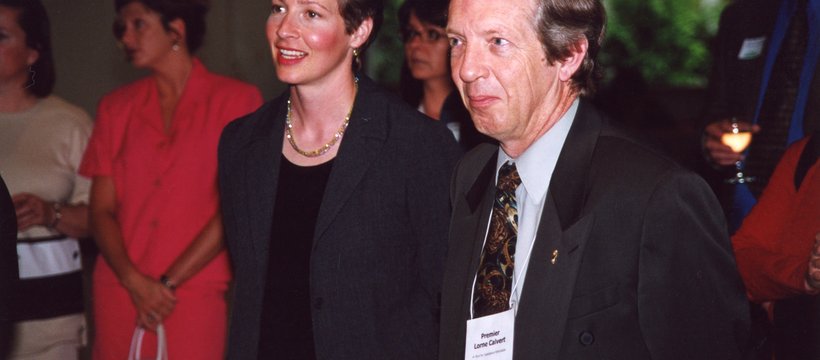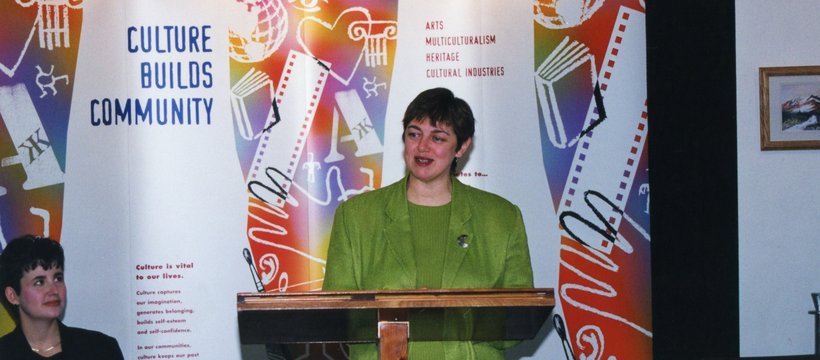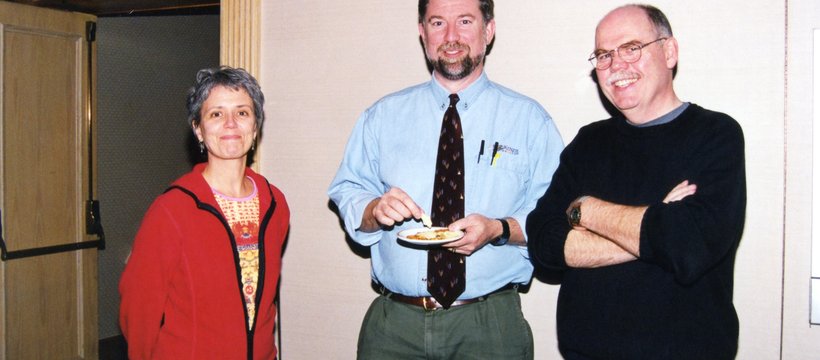The Early Years: 1997 - 2000
On October 18, 1997, the membership passed amendments to the SCCO Constitution and Bylaws that transitioned the organization into what we know today as SaskCulture Inc. The new SaskCulture was principle and value driven. By 1998, the organization had a membership of 39 voting organizations, 58 non-voting and 31 individuals, and had elected a new board. As a new organization, SaskCulture worked closely with its community partners to gather input from its stakeholders and support its forward thinking mandate. By 1998, its staff made a fresh start by moving out of the former SCCO home on Victoria Avenue, to a downtown location at 600, 2220 12th Avenue, in the Bank of Canada Building in Regina.
Shortly after forming SaskCulture, Rose Gilks was hired as General Manager, taking over from Mary Mahon-Jones who had moved on to other opportunities.
During this time, several reviews including the Museum Funding Review, a Cultural Workers Compensation & Benefits Study, and the Cultural Tourism Task Force, took place. In one study in 1999, the Culture Sector Partnership Project, which included the Saskatchewan Sectorial Council for Culture, Arts School Saskatchewan and SaskCulture Inc., conducted an analysis and promotion of cultural training opportunities in Saskatchewan. This project resulted in the successful release of Cultural Opportunities, a database and a print promotional tool profiling opportunities available in the province that was later distributed to Saskatchewan schools. Shortly afterwards, SaskCulture and the Saskatchewan Sectorial Council for Culture (SSCC) decided to form one committee called the SaskCulture Human Resource Council (SHRC). It was hoped that the breadth and strength of SaskCulture combined with the expertise and commitment of the SSCC would ensure that human resource development of cultural workers remained a high priority.
SaskCulture also worked closely with the cultural industries during this time teaming up with other cultural stakeholders to hold a Cultural Export Initiative, called Flatland Culture Goes Global: An Export Forum. The Saskatchewan Cultural Industries Development Council was formed shortly afterwards.
In its early days, SaskCulture continued some of the traditions of SCCO by holding special events to help support the professional development of cultural workers, encourage networking and offer opportunities for members to network with decision-makers. It continued to hold an annual conference for its members, which later became known as its “annual gathering”, as well as holding the annual Volunteer Awards for Culture ceremony in conjunction with its Tri-Global partners. SaskCulture also began holding an annual MLA reception, where members could meet with provincial government Members of the Legislative Assembly. During this time period, SaskCulture spent considerable time responding to a Municipal Task Force on Legislative Renewal in order to ensure that Municipal Affairs, Culture and Housing, the government department responsible for culture at the time, was taking the interests of the cultural community into account when reshaping local governments.
By the end of 1999, SaskCulture successfully launched a new funding program – the Multicultural Initiatives Fund, designed to stimulate ethno-cultural and multicultural programs and activities throughout the province. The development of this fund was seen as an important addition to the resources available from the Culture Section of the Trust Fund for Saskatchewan’s multicultural community.
In the arts, the Saskatchewan Arts Alliance, founded in 1984, became the first formalized Community of Interest for the Arts. As for heritage, in May 2000, a provincial forum was convened to develop an internal Heritage Community of Interest mechanism. A previous meeting in 1999 in Manitou had helped set the stage for the community working together on heritage interests.
Communication of the new SaskCulture and its mission and vision were important during this period. After establishing a new Communication Manager position, work continued to build the SaskCulture brand and launch a new benefits statement of Culture Builds Community! (an idea contributed by the Past President Ken Sagal). In 2000, the campaign, which used posters, advertisements, flyers, folders and a trade show display - targeted key groups, such as business leaders, governments and member organizations. Shortly afterward, SaskCulture also started the weekly distribution of SaskCulture E-Update which was sent to all members and community partners, via the Internet.
This new communication network brought great news on June 13, 2000, when a new Lottery Licence Agreement was signed by Minister Clay Serby and the Tri-global partners, setting a 9.5 per cent licence fee and a commitment by the partners to increase support to the Indigenous community and continued work on a provincial/regional/community delivery mechanism. Minister Serby announced the new lottery licence at a MLA Reception held in conjunction with the Saskatchewan Arts Board, praising the community for its work in building and maintaining culture in Saskatchewan.
The earlier work on the Cultural Tourism Task Team led to the establishment of the Cultural Tourism Advisory Council, a committee of Tourism Saskatchewan. The Council advised Tourism Saskatchewan on the development of future cultural tourism initiatives. This work culminated in a cultural tourism symposium, called Creating Wealth through Cultural Tourism, held early in 2001. This partnership, along with the upcoming 100th anniversary of the province, was the impetus for the partners in tourism, sport, recreation and government developing the Saskatchewan Online Events Guide. At the time, this database was credited as being the most comprehensive collection of provincial events available online.
Besides the growing interest in other sectors, SaskCulture continued to support the needs of cultural workers. In 2000, it prepared, published and distributed the SaskCulture Handbook for Member Organizations, and held regular meetings, called Staff Network Meetings, with organizational leaders. The SaskCulture board embarked on a series of member consultations to gather feedback and discuss emerging issues, including the government’s plans to develop a Cultural Policy framework and a paper by Dr. Joy Cohnstaedt offering a draft set of assumptions for the government’s framework. SaskCulture would remain a key player in the development of a new provincial cultural policy for years to come.




